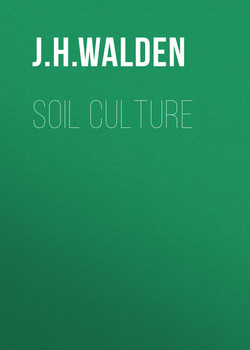Читать книгу Soil Culture - J. H. Walden - Страница 19
SOIL CULTURE
BLACKBERRY
ОглавлениеThis berry grows wild, in great abundance, in many parts of the country. It has been so plentiful, especially in the newer parts, that its cultivation has not been much attended to until recently. Like all other berries, the cultivated bear the largest and best fruit.
Uses.—It is one of the finest desert berries; excellent in milk, and for tarts, pies, &c. Blackberries make the best vinegar for table use, and a wine that retains the peculiar flavor, and of a beautiful color.
This berry comes in after the raspberries, and ripens long in succession on the same bush.
High-bush Blackberry.
Varieties of wild ones, usually found growing in the borders of fields and woods, are the low-bush and the high-bush. Downing gives the first place to the low. Our experience is, that the high is the best bearer of the best fruit. We have often gathered them one and one fourth inches in length, very black, and of delicious sweetness. The low ones that have come under our observation have been smaller and nearer round, and not nearly so sweet.
The best cultivated varieties are—
The Dorchester—Introduced from Massachusetts, and a vigorous, large, regular bearer.
Lawton, or New Rochelle.—This is the great blackberry of this country, by the side of which, no other, yet known, need be cultivated. It is a very hardy, great grower. It is an enormous bearer of such fruit that it commands thirty cents per quart, when other blackberries sell for ten. On a rather moist, heavy loam, and especially in the shade, its productions are truly wonderful. Continues to ripen daily for six weeks.
Propagation is by offshoots from the old roots, or by seeds. When by seeds, they should be planted in mellow soil, and where the sun will not shine on them between eight and five o'clock in hot weather. In transplanting, much care is requisite. The bark of the roots is like evergreens, very tender and easily broken, or injured by exposure to the atmosphere; hence, take up carefully, and keep covered from sun and air until transplanted. This is destined to become one of the universally-cultivated small fruits—as much so as the strawberry. The best manures are, wood-ashes, leaves, decayed wood, and all kinds of coarse litter, with stable manure well incorporated with the soil, before transplanting. Animal manure should not be very plentifully applied.
We have seen in Illinois a vigorous bush, and apparently good bearer, of perfect fruit—a variety called white blackberry. The fruit was greenish and pleasant to the taste.
